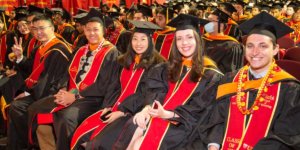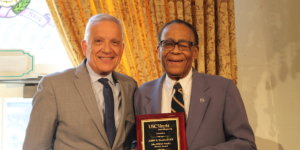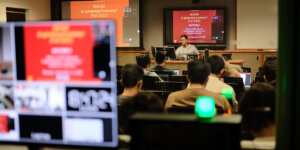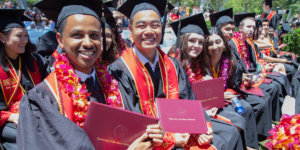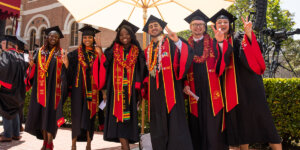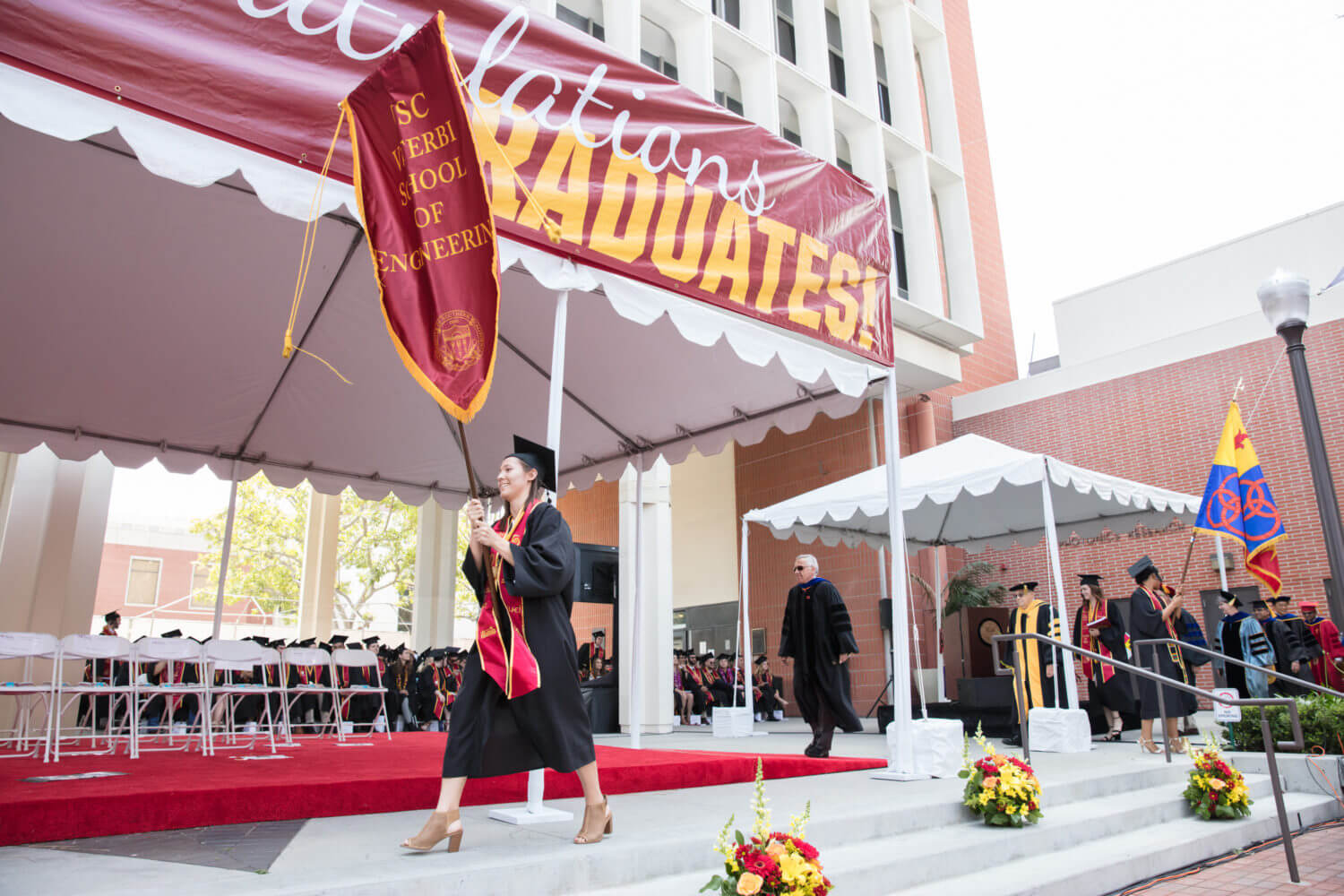
Betty Stearns, ’17 B.S. aerospace and mechanical engineering, carries the school flag across the stage at the 89th USC Viterbi commencement ceremony Photo / Victor Leung
>> Click here to view full photo album
The California sun took it’s sweet time to shine upon the USC Viterbi graduating class of 2017, but when it broke through the clouds about two hours into the 89th commencement ceremony, it cast the entire procession into brilliant cardinal and gold.
The 600 plus Viterbi graduates stood there, in the full bloom of youth, savoring the sweetness of the moment, basking in the afterglow of a good feeling as the day wore on them.
It had arrived. Their giant leap into the real world. Some dreading the moment, others praying to hasten its arrival.
Before removing their caps and gowns, they looked once more upon parents, grandparents, brothers and sisters, trying to recognize themselves in them. But lost in themselves, declaring their victory and individuality, they were too excited to take stock of time.
They’ve been told over and over again that their greatest possession is time — “once lost, you can’t take it back,” Dean Yannis Yortsos reminded them. But perhaps the greatest possession of the class of 2017 is optimism.
“You’ve endured countless tests, impossible homework, mind-twisting assignments, all in vanishingly small time intervals,” Yortsos said.

“Today, thanks to engineering and technology, the world is being re-created and re-imagined like never before, with an astonishing speed, in front of our very eyes,” Yortsos told the students. “And it is engineers and visionaries like you that drive this re-imagination.”
Yortsos went on to quote one of his favorites quantum physicists, David Deutsch, who famously said: “There will always be problems. But all problems are solvable through science and engineering.” It’s this mindset that the graduates share.
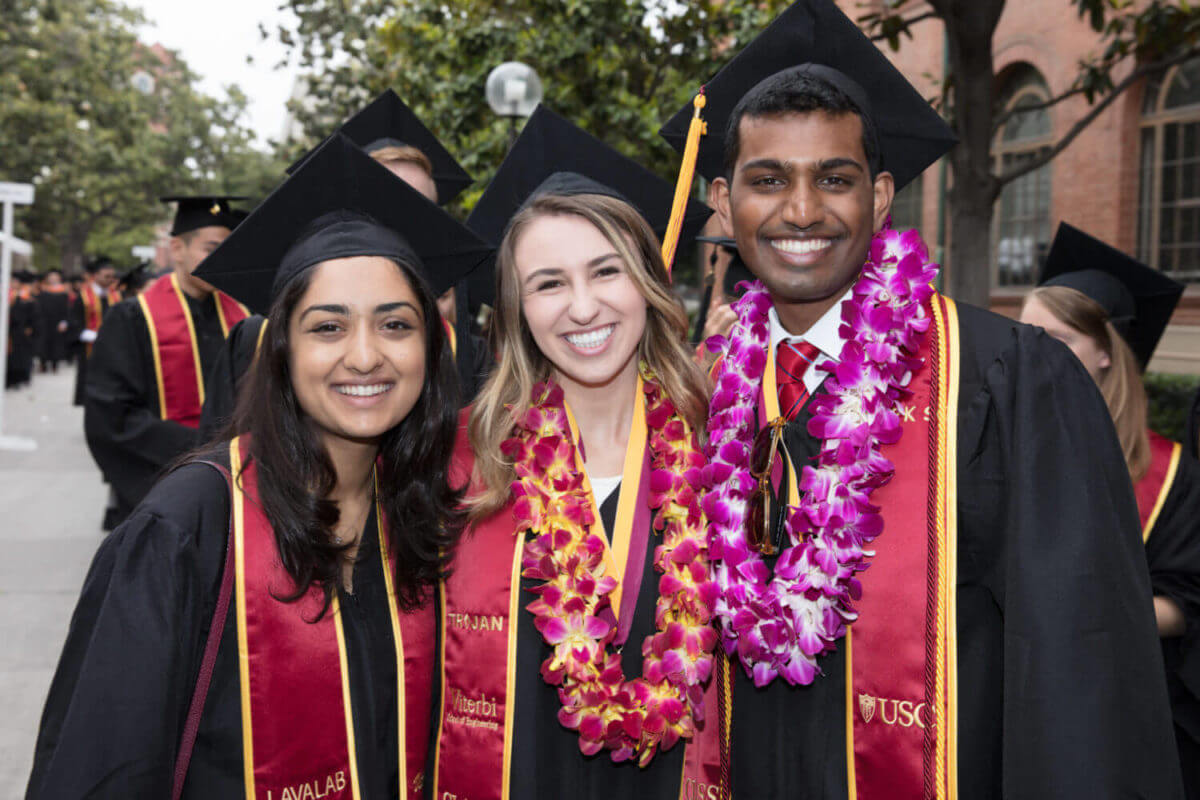
The USC Viterbi class of 2017 has made convergence not just part of their curriculum but their everyday lives. Photo / Victor Leung
“This is the canvas on which you will paint beautiful pictures with brilliant colors and your magical brush,” Yortsos said.
Ellen Emerson, B.S. computer science and physics ’17, took the stage as valedictorian, revealing that she is the fifth of five children to graduate from USC. Her parents are both USC professors.
“The talents of this class goes beyond engineering,” said Emerson who just accepted a position at Amazon. “I’ve met accomplished athletes, artists, performers and leaders. If we can do all this as students, I can’t wait to see the work that we’ll do in the future.”
Emerson, who is a Presidential Scholar and a member of the WVT Rusch Honors Program, is a prime example of the multidisciplinary tendencies of this class. She has served as an undergraduate teaching assistant for computer science and an undergraduate research assistant. She was also president of the USC Women’s Ice Hockey team and a Viterbi Student Ambassador. She is a member of both ACM and Eta Kappa Nu.
“I know we’ll see the success of Viterbi graduates on bigger and bigger stages in the years to come,” she said.

Dean Yortsos then introduced commencement speaker: Qualcomm co-founder and USC Viterbi School namesake, Andrew Viterbi. A USC trustee, Viterbi earned his doctorate in electrical engineering at USC in 1962.
In 1967, he invented the Viterbi Algorithm, a mathematical formula to eliminate signal interference, which paved the way for the widespread use of cellular technology and wireless communications. This year, the engineering world celebrated the 50th anniversary of the Viterbi Algorithm. Since then, it has been widely employed in satellite broadcast TV receivers and mobile phones, in speech recognition and computer search engines, data terminals and deep space telemetry. It’s not an oversimplification to say it has enabled modern-day communications and literally brought the world closer together.
“Your reward is the opportunity to enter a profession which is unique in influencing the development of our nation and of our world.”
Andrew Viterbi
Viterbi congratulated the graduates for choosing “one of the more intellectually demanding curricula among academic offerings.”
“Your reward is the opportunity to enter a profession which is unique in influencing the development of our nation and of our world,” he added. “When I was in your shoes about 60 years ago, I was vaguely aware that engineering could be interesting, but I never dreamt it could be so much fun.”
Viterbi noted that while some will be completely drawn to engineering as a profession, some will go on to be physicians, lawyers, investment bankers or financial experts.
“To you, I would say you could not have picked a better undergraduate major to get started,” said Viterbi. “With an engineering background you have not only the understanding — some might say lack of intimidation — for working with technology. And even more important in science and technology, cross-fertilization of fields often produces the greatest breakthroughs and unexpected results.”
Viterbi emphasized that whatever path they choose, the engineering graduates will form the “human capital” which empowers the development of technology.
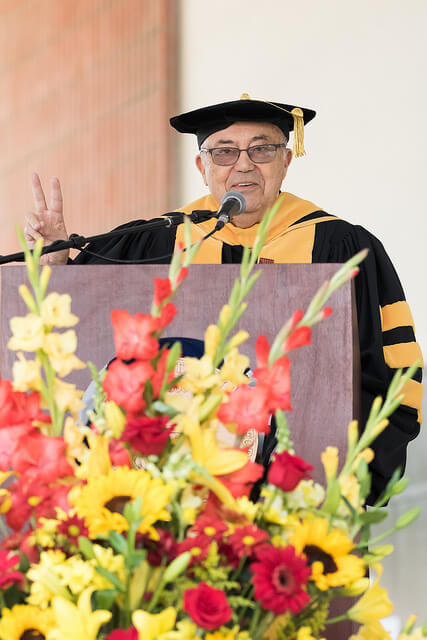
Dr. Andrew Viterbi, University trustee and 2017 commencement speaker. Photo / Victor Leung
“Without you and your predecessors and successors,” said Viterbi, “there would not be a Silicon Valley or a Silicon Beach, a biotech industry, an aerospace industry or a superhighway – neither the one populated by cars, nor the one which carries bits.”
The success of the USC Viterbi School in educating and augmenting our “human capital” and providing diversity among our future leaders is demonstrated by the makeup of 2017’s graduating class. In addition to the international students which account for 14 percent, USC Viterbi has significantly larger percentages of women graduates (32 percent) and under-represented minorities (18 percent). Even allowing for overlaps, these two demographics make up almost half the class.

These students did not spend their waking hours in a freestanding unit with a bathroom-to-resident ratio greater than one. They lived in the midst of friends, robotics and biomedical labs, hackathons, makeathons, game demos, startups and business model competitions. They danced. They participated. They lost their lungs at home games. They cried together and laughed together. Community was their native state.
“In adversity, you tried to control the things that you could,” Yortsos told them in closing. “But you chose hope and faith over fear and despair, for the things that you couldn’t. And you kept your Fight On!”
Published on May 12th, 2017
Last updated on May 2nd, 2018




